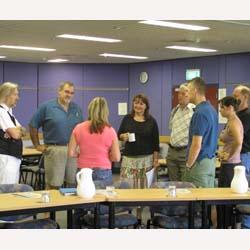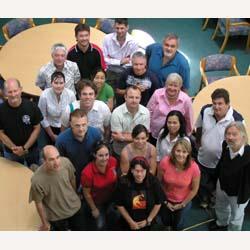Rapid tests for toxins in drinking water and seafoods among goals of workshop participants
Published on 20 November, 2006
Around 20 key researchers who study toxic algal blooms which can effect drinking water and seafoods gathered in Gladstone over the weekend (November 18-19).
The event was the annual workshop of ARNAT, the Australian Research Network for Algal Toxins.
It was hosted by CQU's Centre for Environmental Management and officially opened by CQU Pro-Vice-Chancellor (Research and Innovation) Professor Jennelle Kyd.
 CQU's representative on the organising committee, Dr Larelle Fabbro said "we have been fostering scientific interactions, and educating ourselves about the different techniques and approaches being used to tackle similar research problems".
CQU's representative on the organising committee, Dr Larelle Fabbro said "we have been fostering scientific interactions, and educating ourselves about the different techniques and approaches being used to tackle similar research problems".
Dr Fabbro said participants focused on a range of issues, including treatment of ships' ballast water to protect the reef from nuisance and toxic inputs from overseas.
"The workshop went well with discussions about the latest equipment and genetics methods available to test for toxins, problems with transporting water and toxin-producing algae in both ballast water and pipelines, bioaccumulation of toxins in plants and animals, health and safety guidelines and the latest water treatment techniques," Dr Fabbro said.
CQ region participants included: Trinh Tran from CCI Gladstone, Clancie Saverin from the Gladstone Area Water Board, Dr Leonie Andersen from CQU Gladstone's Centre for Environmental Management, Howard Howell from Ecoscope in Rockhampton and CQU Rockhampton-based staff members Dr Fabbro, Leonie Barnett, Susan White, Dr Susan Kinnear, Christian Crosby and Dr Andrew Fenning.
 Other organisations represented included: Queensland Health Scientific Services, Cleveland Biosensors, the University of Tasmania School of Plant Science, the Australian Institute of Marine Science, the Queensland Department of Natural Resources and Water, the SouthEast Queensland Water Corporation, SA Water, Griffith University and EnTox (the National Research Centre for Environmental Toxicology at UQ).
Other organisations represented included: Queensland Health Scientific Services, Cleveland Biosensors, the University of Tasmania School of Plant Science, the Australian Institute of Marine Science, the Queensland Department of Natural Resources and Water, the SouthEast Queensland Water Corporation, SA Water, Griffith University and EnTox (the National Research Centre for Environmental Toxicology at UQ).
Toxic algae are found in both the marine and freshwater environments and may adversely affect human health, water quality, livestock, wildlife, tourism and aquaculture operations.
Photo (above): Researchers from throughout Australia gathered at CQU Gladstone.
Photo (below): Participants had plenty of opportunity for interaction.

